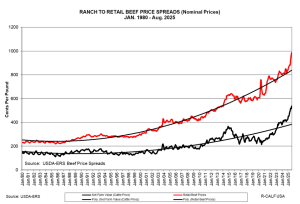US Cattle Herd Shrinks to Smallest in Decades, Driving Beef Prices Up

A recent episode of Bloomberg's "Odd Lots" podcast, co-hosted by Joe Weisenthal and Tracy Alloway, highlighted the significant contraction of the United States cattle herd to its lowest level in decades, leading to a surge in beef prices. The discussion, featuring Bill Bullard, CEO of R-CALF USA, a trade association for independent cattle ranchers, explored the multifaceted reasons behind this trend, including drought, increased feed costs, and profound industry consolidation. This development has turned hamburgers and steaks into a focal point of the ongoing political debate surrounding rising food costs.
According to Bullard, the U.S. has seen a dramatic decline in its cattle industry over the past generation. "We've wiped out over half of all the beef cattle operations in business," Bullard stated, noting a 52% reduction in producers. This consolidation has resulted in the four largest meatpackers now controlling approximately 80% of the market, a stark increase from 36% in 1980.
The podcast detailed how this concentration has shifted the allocation of consumer spending. Historically, over 60 cents of every dollar spent on beef went to live cattle producers. However, by 2021, this figure reversed, with packers and retailers receiving over 60 cents, while producers received less than 40 cents. This imbalance, coupled with a lack of antitrust enforcement and increased beef imports, has severely impacted the profitability of independent ranchers.
Bullard emphasized the long biological cycle of cattle, which makes herd expansion a slow process, typically requiring about three years. He also pointed out that despite current high cattle prices that should incentivize expansion, producers remain hesitant due to past market failures and the ongoing threat of imports. The U.S. currently produces about three billion pounds less beef than it consumes, with imports filling the gap without mandatory country-of-origin labeling, preventing consumers from making informed choices.
The discussion also touched upon the "chickenization" of the beef industry, a term referring to vertical integration seen in poultry and hog sectors, where corporations dictate production practices. Walmart's recent entry into beef processing was cited as an example of this trend, raising concerns among independent ranchers about further erosion of competitive markets and the viability of family farms.